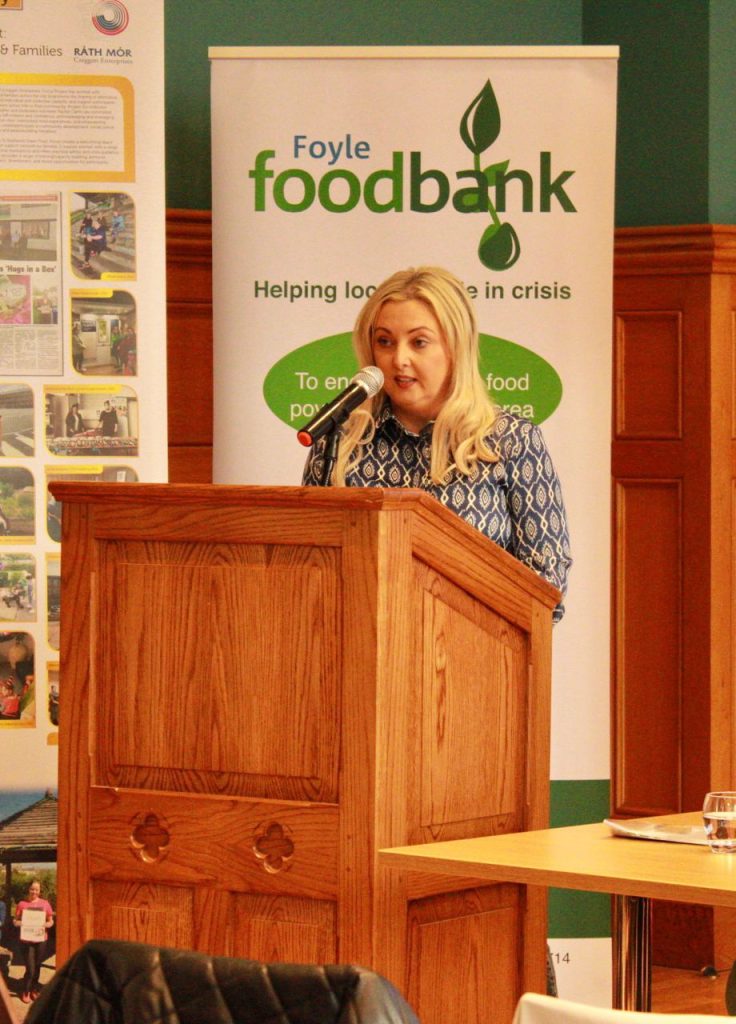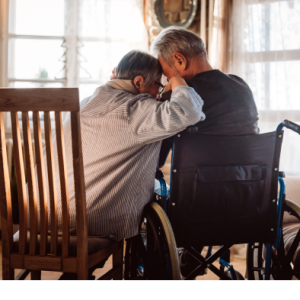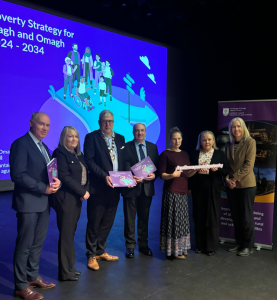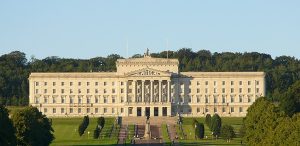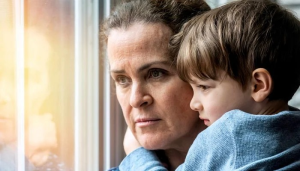Foodbanks preparing for a busy winter
6 November 2023
By Karen Mullan
Karen Mullan is the Strategic Development Manager of the Foyle Foodbank, supported by The Trussell Trust. The following is the speech she gave at NIAPN’s ‘Poverty is a Political Choice’ event for the International Day for the Eradication of Poverty.
I want to thank Becca and NI Anti-Poverty Network for organising todays event as part of the International Day for the Eradication of Poverty.
Foyle Foodbank exists to support people in poverty and crisis and we work to address that crisis and the root causes of poverty.
We do this through the provision of a referral network, working with partnership organisations, and one to one wraparound support. This includes, but is not limited to, advice on debt, benefits, budgeting, healthy eating, housing, physical and mental health referrals, education, training and volunteering opportunities to enhance employability skills, whilst having access to nonperishable and fresh food, hygiene and household products, fuel and other voucher support over a period of months.
We are a volunteer led organisation with over 50 volunteers who contribute daily to support our work, alongside staff from various businesses who attend periodically to help with our work.
Foyle Foodbank is affiliated to The Trussell Trust, a charity which supports a network of around 1,300 foodbanks across England, Scotland, Wales and here. In April last year, I came onboard under The Trussell Trust Pathfinder Programme which looks at the reason why the person is attending the foodbank, to develop wrap around support services, enhance partnerships and lobby to bring about change.
Our service provision includes emergency food and household packages and longer-term food and household support. We have a small shop set up at our unit in Springtown where everyone is encouraged to do their own shop, which allows them to choose the items that they like. We are currently running out of one of the Community Supermarkets funded by the Department for Communities.
We have just over 150 referral organisations registered with us, right across the Community & Voluntary and Statutory sector, health services, political parties, colleges, churches and others make referrals. Our highest referrals are still self-referrals.
We have project staff who support individuals and families based on their needs and work alongside them for whatever time period required. They will make referrals to a wide range of organisations to provide that wider support to get people back on their feet, so that hopefully they will never have to use a foodbank again.
We have an in-house financial inclusion project which aims to maximise people’s income. We do this in partnership with the four advice services and three credit unions in the City providing benefit advice, specialist debt advice, savings and good credit, and we provide one to one budgeting and money management advice.
We work with organisations in communities. We currently have a Baby Hub providing family and baby toiletries to registered members in Skeoge Community Hub. As part of that scheme we are piloting a credit union savings scheme for registered babies. From the fee they pay us, we save £2 per week alongside the parent saving.
Over the summer we have provided 15 organisations across the city with breakfast items for summer schemes and hot lunches, which are cooked at our facility, for 130 children for 4 weeks. We are supporting the Old Library Trust to provide hot lunches for 30 people weekly at their centre.
We are prepared for a busier winter. We have seen an increase in demand for our services, with more people who are working, off on maternity and sickness. People are struggling to meet household bills with rising costs in home heating, food, rent and mortgage payments. People in need of our support are struggling with these costs alongside other life events and social and economic factors such as a bereavement, family break up, debt, being off work because of an accident or illness, addiction and mental health issues. And, these life events are combined with many on low paid jobs and a benefit system that does not provide enough to cover the essentials.
We at Trussell Trust are calling for the urgent restoration of the Executive and the Assembly. This should be a priority in order to provide the policies that will protect people from destitution, such as the full implementation of recommendations from the reviews of welfare mitigations and discretionary support, and the delivery of an anti-poverty strategy. I would add to that the immediate delivery of a childcare strategy.
Upon restoration, the Executive should set up a Financial Inclusion Service to provide advice and support to people in the private rented sector who have been impacted by the freezing of the Local Housing Allowance.
And recommendations to the UK Government include:
Introducing an Essentials Guarantee to make sure that the basic rate of Universal Credit is at least enough to afford the essentials we all need.
To take a person-centred approach to the delivery of social security across the system including involving disabled people in the system design – from application, to assessments, to decision making.
Over and above this we fully support the Cliff Edge Coalition asks and those asks are:
- 1) Resolving the five week wait in Universal Credit
- 2) Mitigating the two-child limit
- 3) Providing support to private renters affected by the Local Housing Allowance within the context of the current challenge of no functioning NI Exec
I want to finish by saying we want to see a future where no one has to go to a charity for food support – a future where all our systems provide the support needed to protect people from poverty and bring about the end to the need for Foodbanks.
Find out more information about the Foyle Foodbank, how you can make a referral or how you can donate or volunteer.
Add your name to the Guarantee our Essentials Campaign, which calls on political party leaders to support the introduction of an Essentials Guarantee within Universal Credit to ensure that the basic rate at least covers life’s essentials, such as food and bills.


